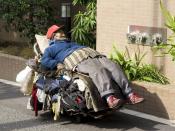In Canada, homelessness is a rapidly growing social injustice. The stigma and degradation faced day after day by the homeless people of Toronto, is more than atrocious. Our society is quick to assign blame, while homelessness has become synonymous with idleness, and lack of education. Stereotypes and selective perception have blinded us from the true factors causing, and maintaining this crisis. We fail to see that at least 30 percent of people living on the street, struggle with mental illness. Mental disabilities, coupled with lack of adequate housing, make for a fatal combination. This issue affects not only the individual suffering, but also the person's family, and the community as a whole.
More often than not, a homeless person is one who had once been a productive member of society. The individual living this life of poverty is little more than a prisoner. They are imprisoned by a lifestyle that brings about a feeling of isolation, hopelessness, and embarrassment.
They are looked down upon by society, and ridiculed. They are ignored when asking for help, and denied when seeking employment. A psychological state of depression is inevitable, especially for those already struggling with other mental illnesses, such as schizophrenia. For some, anomic suicide may seem to be the answer. For others, a choice is not awarded, as they lose their lives to the freezing nights or to untreated diseases. Homeless life is no life at all. To these individuals, as well as to the rest of society, a home is not only a place to live. A home brings a feeling of security, and belonging. Those who have been homeless probably understand this notion more profoundly, than those of us who have been fortunate enough to never go without. A perfect example of this is seen in Linda Chamberlain, a member of the Dream Team. Linda suffered with mental disability partially due to, and sustained by, her life on the streets. She had spent a great deal of her life living in various rooming houses she now refers to as "hellholes." With no heat, no running water, and most importantly to Linda, no windows, these apartments took her through stages of depression, loneliness, and isolation. Supportive housing gave Linda a chance for a new life, a hope for improvement, and another day to look forward to. Although the place was small and modest, she did not believe that she deserved it. She found work, made friends, and finally felt "needed and wanted." Linda is one of the more fortunate examples of the homeless people who receive the aid to gain liberation from their prisons of poverty. However, thousands more fall asleep each night wondering when they will deserve the fundamental right to adequate housing.
Although homelessness psychologically torments an individual, it manages to affect their entire family. When we speak of homeless people, we tend to look at adults, where in fact, millions of children are affected by this crisis. The fact of the matter is, that a homeless parent will result in a homeless child. Through modelling, children who have grown up on the streets become more likely to repeat their parents' lifestyle with their own offspring. This endorses a vicious cycle of poverty. Moreover, a person living without adequate housing, while battling a mental disease, may arouse feelings of anxiety within the rest of their family. A mother may fall into depression from constantly worrying about her son's life on the streets. A father may feel worthless because he cannot afford to provide financial support for his mentally challenged daughter. The person living on the street may use their families as a scapegoat, blaming them for their personal misfortunes. This may alienate them from their family, causing further isolation.
Aside from the individual and his or her family, the community is immensely affected both economically and socially. Homelessness further weighs down on the heavily burdened tax system, and increases our incessant crime rate. This in turn, leads to a need for more police officers, and a growing number of total institutions--programs which are funded by taxpayer money. It seems only natural for regular citizens to view the homeless as a plague to our society. As a result of our society of violence, and the socialization we derive from the media, we have become desensitized. On the streets of Toronto, the homeless have become an "invisible" minority. We no longer bother to stop and sympathize, or even despise, but rather ignore and continue to wallow in this ignorance. We deny that this problem affects the entire community, and follow our individualistic notions of life. We forget the truth of John Donne's words--"no man is an island entire of itself." The community has adopted a condescending attitude towards those living in poverty. Capitalism has transformed the idea of inability to find suitable employment, into unwillingness to work. Perhaps this is the basis for the stereotyping of the homeless and disabled, as lazy and useless.
The lack of adequate housing, and the problems posed by mental illness are complex difficulties of our society. Although steps have been taken to help a few of these individuals off the streets, much more can still be done. Homeless families can be offered support services and community-based treatment. Attempts should be made to integrate these people back into the community. Supported housing will provide them with more affordable homes, and a chance to once more become productive members of society. This will serve to restore their self-esteem and self-confidence. The social and economical costs are greater if the problem is ignored, and will further have a devastating impact on our society.



Looks Incomplete
I beleive, this topic could have been dealt in more detail, unless the author had some limit on words in is mind
0 out of 0 people found this comment useful.